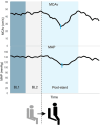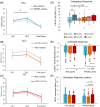APOE4 carriers display loss of anticipatory cerebrovascular regulation across the Alzheimer's disease continuum
- PMID: 40346723
- PMCID: PMC12064416
- DOI: 10.1002/alz.70229
APOE4 carriers display loss of anticipatory cerebrovascular regulation across the Alzheimer's disease continuum
Abstract
Background: Maintenance of cerebral blood flow during orthostasis is impaired with aging and associated with cognitive decline, but the effect of the apolipoprotein ɛ4 allele (APOE4) is unknown.
Methods: Older adults (n = 108) (APOE4 carriers, n = 47; non-carriers, n = 61) diagnosed as having normal cognition (NC), mild cognitive impairment (MCI), or Alzheimer's disease (AD) underwent transcranial Doppler ultrasound assessment of middle cerebral artery blood velocity (MCAv) and beat-to-beat mean arterial blood pressure (MAP) during a sit-to-stand transition. Anticipatory and orthostasis-induced MCAv and MAP responses were compared between genotypes and diagnostic classifications.
Results: Cognitively normal APOE4 carriers showed greater anticipatory MCAv increase, greater MCAv decrease with orthostasis, and shorter latency of peripheral MAP responses to orthostasis compared to non-carriers. MCAv and MAP responses were delayed and attenuated across the APOE4 disease continuum, with no differences between genotypes in MCI and AD.
Discussion: Unique cerebral and peripheral vascular compensation observed in APOE4 carriers may be neuroprotective for AD development.
Highlights: APOE4 carriers with NC show greater anticipatory increases in MCAv prior to orthostasis and decreases during orthostasis. APOE4 carriers with NC show faster peripheral MAP responses during orthostasis. APOE4 carriers with MCI and AD display loss of anticipatory MCAv responses. APOE4 carriers with MCI and AD display slower peripheral MAP responses. Unique cerebral and peripheral vascular compensation observed in APOE4 carriers may be neuroprotective for AD development.
Keywords: Alzheimer's disease; apolipoprotein E ε4; dynamic cerebral autoregulation; mild cognitive impairment; transcranial Doppler ultrasound.
© 2025 The Author(s). Alzheimer's & Dementia published by Wiley Periodicals LLC on behalf of Alzheimer's Association.
Conflict of interest statement
The authors have no conflicts of interest to disclose. Author disclosures are available in Supporting Information.
Figures



Update of
-
APOE4 carriers display loss of anticipatory cerebral vascular regulation over AD progression.medRxiv [Preprint]. 2024 Oct 13:2024.10.11.24315344. doi: 10.1101/2024.10.11.24315344. medRxiv. 2024. Update in: Alzheimers Dement. 2025 May;21(5):e70229. doi: 10.1002/alz.70229. PMID: 39417136 Free PMC article. Updated. Preprint.
Similar articles
-
APOE4 carriers display loss of anticipatory cerebral vascular regulation over AD progression.medRxiv [Preprint]. 2024 Oct 13:2024.10.11.24315344. doi: 10.1101/2024.10.11.24315344. medRxiv. 2024. Update in: Alzheimers Dement. 2025 May;21(5):e70229. doi: 10.1002/alz.70229. PMID: 39417136 Free PMC article. Updated. Preprint.
-
Effect of mild cognitive impairment and APOE genotype on resting cerebral blood flow and its association with cognition.J Cereb Blood Flow Metab. 2012 Aug;32(8):1589-99. doi: 10.1038/jcbfm.2012.58. Epub 2012 May 2. J Cereb Blood Flow Metab. 2012. PMID: 22549621 Free PMC article.
-
Apolipoprotein E ε4 and age effects on florbetapir positron emission tomography in healthy aging and Alzheimer disease.Neurobiol Aging. 2013 Jan;34(1):1-12. doi: 10.1016/j.neurobiolaging.2012.04.017. Epub 2012 May 24. Neurobiol Aging. 2013. PMID: 22633529
-
APOE genotype-dependent pharmacogenetic responses to rapamycin for preventing Alzheimer's disease.Neurobiol Dis. 2020 Jun;139:104834. doi: 10.1016/j.nbd.2020.104834. Epub 2020 Mar 12. Neurobiol Dis. 2020. PMID: 32173556 Free PMC article. Review.
-
Neuroimaging biomarkers for Alzheimer's disease in asymptomatic APOE4 carriers.Rev Neurol (Paris). 2013 Oct;169(10):729-36. doi: 10.1016/j.neurol.2013.07.025. Epub 2013 Sep 6. Rev Neurol (Paris). 2013. PMID: 24016463 Review.
Cited by
-
Synergistic effects of multiple pathological processes on Alzheimer's disease risk: Evidence for age-dependent stroke interactions.J Prev Alzheimers Dis. 2025 Sep;12(8):100268. doi: 10.1016/j.tjpad.2025.100268. Epub 2025 Jul 15. J Prev Alzheimers Dis. 2025. PMID: 40670231 Free PMC article.
References
MeSH terms
Substances
Grants and funding
LinkOut - more resources
Full Text Sources
Medical

